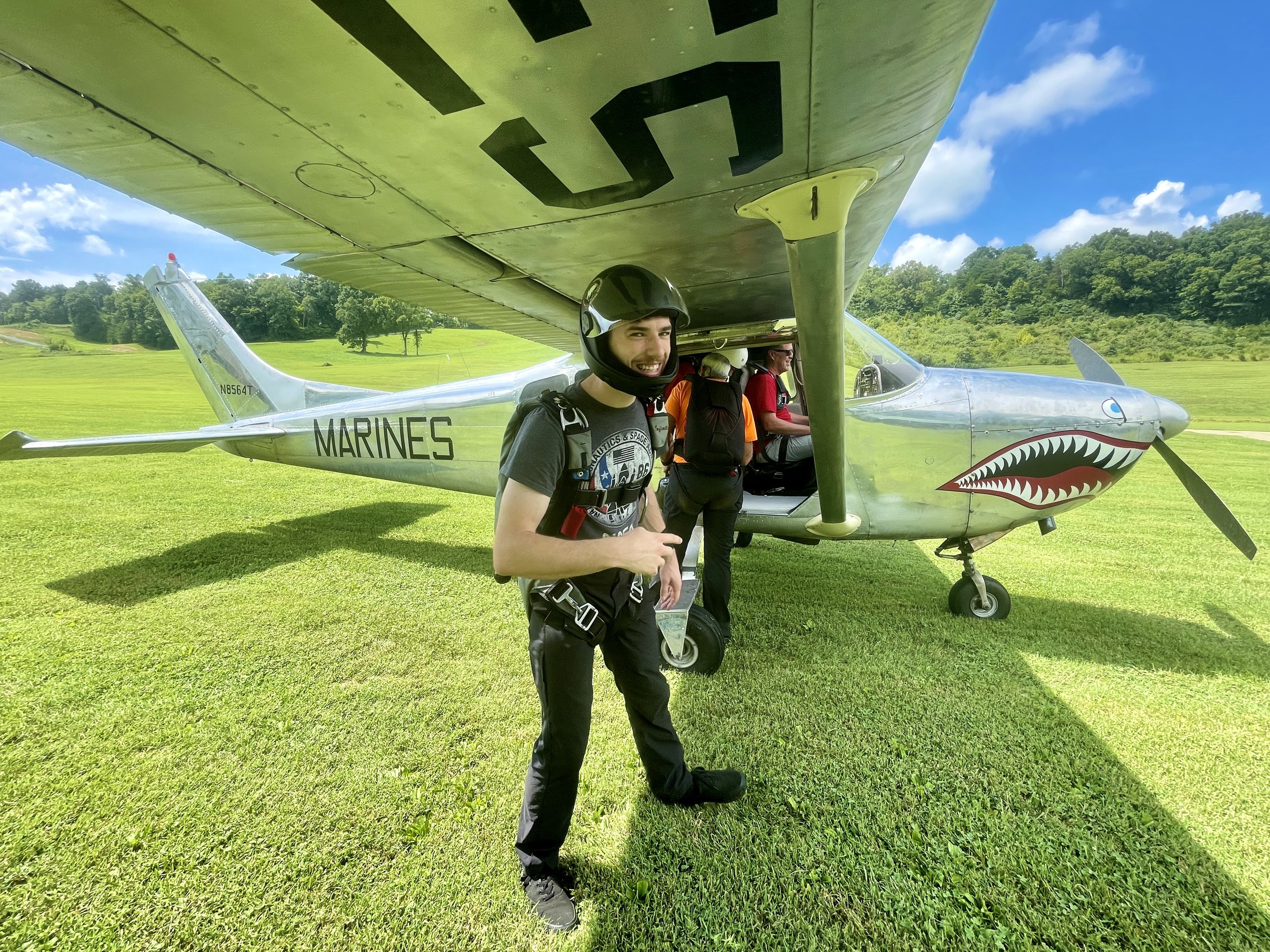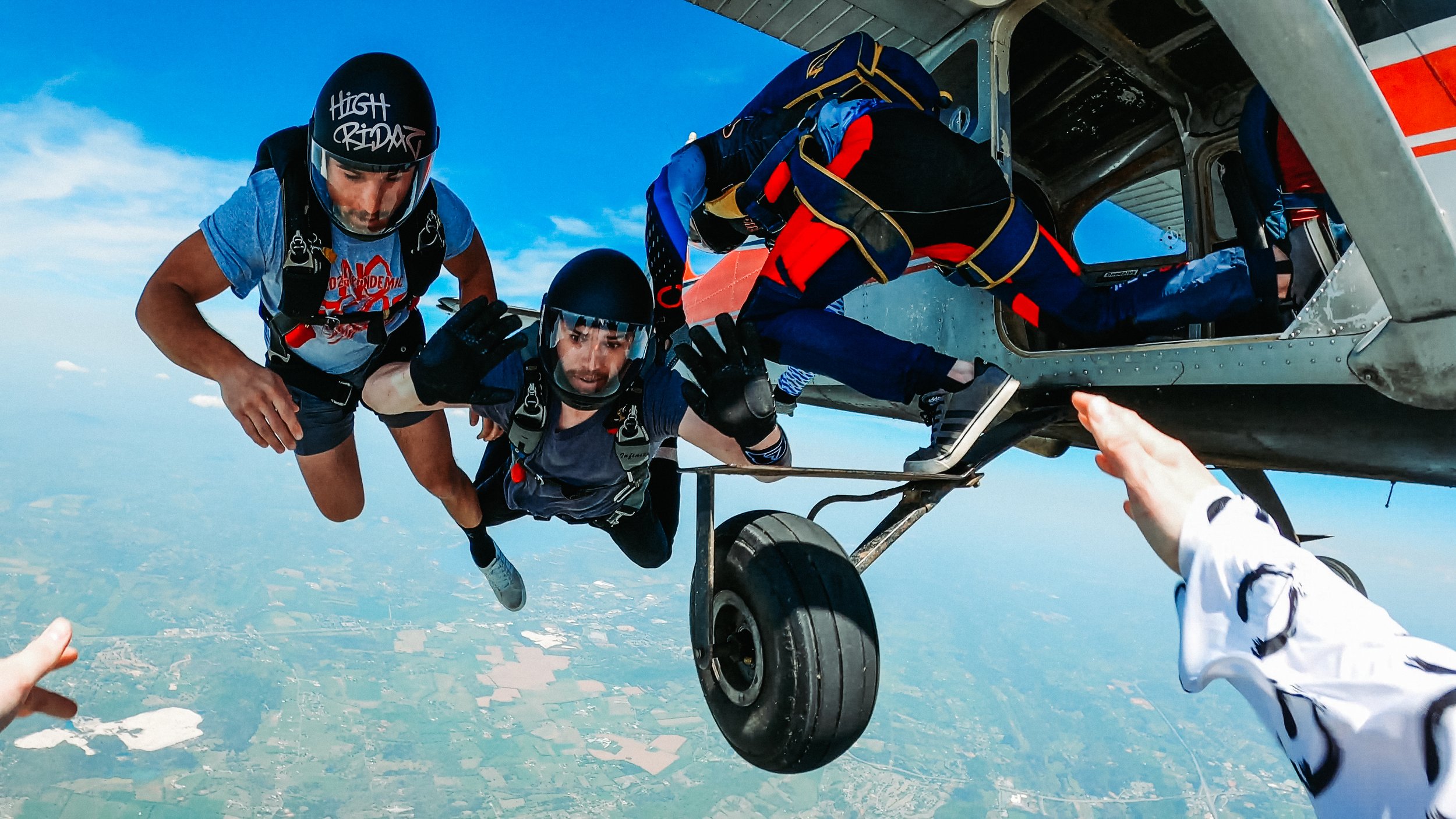The Hardest Thing I’ve Ever Done
Over the years, I have been in a lot of challenging situations. But by far the most difficult thing I’ve had to face happened on October 16, 2020. That was the day I found myself at the edge of an open airplane door, looking down at 13,500 feet of nothing but air and the unstoppable force of gravity. And then I jumped.
Learning to Skydive
Gearing up for my first skydive (October 2020).
That day was my first skydive as I trained to become a licensed skydiver. But unlike fun (tandem) jumps, the first skydive I did was not attached to an instructor. Instead, after a day of ground school, we went up in the plane, worked through the countdown, and I stepped out of the aircraft, with only two instructors holding on to me.
There's really nothing like plummeting towards the earth in total freefall. It is utterly unlike anything we experience in normal life, and it is hard to put into words. So much happens so fast that its easy to make the common mistake of skydiving students: total mental lock-up. There is just so much new sensory input that the brain can't keep track of things (which is a serious issue when falling out of the sky). This is definitely what I experienced, but after a few shakes from the instructor I remembered the various procedures I was supposed to do.
Me and friends about to spend the next minute falling a mile through the sky.
Before I knew it, we had been falling for a whole minute and it was time to pull my parachute. The suspense of waiting a few seconds (which is an absolute eternity when you're in freefall) for the chute to open was nerve racking. There are no words to describe what it feels like when you look up and you see a beautiful, perfect canopy overhead.
And so began my journey of learning to skydive. Over the last year and a half, I have been slowing building the skills and mental fortitude that it takes to be a skydiver. Each jump builds on the principles of the last, step by step getting closer to that day when the instructors sign off all the skills that must be demonstrated for them to verify I am a safe, reliable, and trustworthy skydiver.
When I started, I quickly found this is a very complex and intricate skillset, and as they say you are always learning something new regardless of how long you've been in the sport. Each jump was a test of will and trust in my skills and the gear I was wearing. There were many days where it felt I would never learn the certain skill needed to progress to the next level. But over time, the complex became understandable, the fear became confidence, and little by little I progressed towards my goal.
Diving exits out of the plane are the best. This was a student training jump, and my first time diiing out of the aircraft instead of leaving off the step.
My instructors were great, and I have to say the bravery to train me as a brand new jumper is no small thing. I had a lot to learn about doing this safely. Probably the hardest aspect for me to get comfortable with was packing my own parachute. It wasn’t as hard as I thought it would be, but it’s still terrifying to think that what I am doing will have to sustain my life in a few short minutes when I jump out of the plane.
It took a year and a half, but I finally completed all the necessary skills to qualify and get my certification as a United States Parachute Association class A skydiver. Lately I’ve been working on perfecting my skills at packing my parachute (that’s kinda an important one to be good at!), doing formation jumping, and learning to fly the parachute with more accuracy and control.
Why It Matters
Skydiving is an incredibly challenging skill set to master. There are a thousand things happening at once, and it goes without saying that the margin for error is quite small. So, of all things I could invest my time in, why did I choose to jump out of airplanes?
This is me being very excited to jump out of what I call “the shark plane” for the first time. :)
It’s a question I wrestled with a lot, and here are some key takeaways.
1. It’s not just for fun.
I’m part of a nonprofit organization, and one of the things we are continually exploring are where are there needs that haven’t been met, what are ways to serve that others haven’t done yet, and are there ways to reach people we haven’t thought of before. One of the areas we are exploring is using skydiving as a means of transporting in aid supplies and personnel into regions that can’t be reached by other means. We made a whole video explaining this, which you can find here. The project is still very much in the exploratory phase, and I have agreed to lead this effort. We don’t know where all it will end up, but we are willing to try. I plan to help coach those coming into the program and find creative ways to use this on the field.
2. It taught me about fear.
When you’re on the way up to do a skydive, the two parts of your brain are at war with each other. The rational part knows you have prepared, that skydiving is much safer than many other activities in life, and that your instructors are utterly trustworthy. The instinctual side of your brain is completely terrified, to the point that you have to struggle to maintain control of yourself. There is literally nothing in life experience that can prepare the hardwired survival instinct that says, “gravity will kill you.” And when you are in that plane, you have two choices. You can submit to the fear, letting it hold you back and step away from the challenge in front of you. Or you can embrace the fear. You can push through, regardless of what you are feeling, and go through the fear to conquer your dream.
Skydiving, more than anything in my life, has taught me how to overcome fear. The part that never ceases to surprise me is that fear in the plane, and all the way up to the skydive itself, is intense. But the moment I leap off the plane, it is the more incredible feeling. Yet, the point of the most fear was the point where I was the safest (in the plane). It is only when I face the fear and go through it that I realize there was no reason for me to hold on to that fear to begin with. There are so many times in my life where I am fearful of something in the future. But now I have learned to take a step back and ask, what do I need that fear for, anyway? I am much better off going through whatever I am fearful of, instead of letting the fear eat at me in anticipation of whatever it is I am scared of. (If you're interested in more on the topic of overcoming fear, I gave a lecture on this; you can view it here.)
3. Having a craft is important.
My work is primarily in the digital, and I believe it’s important to have a craft. A physical, tangible task that requires focus and is real, is so important to mental clarity. What is one thing I do that requires total focus, hones my mind to one thing, and cuts out distraction? For me, skydiving has been that. It is something that is hard enough to constantly push me to be better, but not so out of reach that I give up.
That’s me in the middle, leading the group off the airplane. Jumping with a group is a whole new experience!
So there you have it. That is the story of my skydiving journey. What is something you are fearful of? Are you willing to take the step to push through it, to the other side of fear? I never thought I would ever be a certified skydiver; what dream do you have, and what’s holding you back from trying?
If you found this interesting, you might want to watch the video I made about the entire process of becoming a skydiver. You can find it here on my YouTube channel.





